The Second Vatican Council wanted to foster the liturgical life of the faithful so that, through renewed and enriched rites and prayers, they could participate in the Liturgy in a conscious, pious and active way, as their baptismal priesthood demands. To this end, at a later stage, various working groups were charged with carrying out the necessary reform, reflecting the theological and pastoral teachings of the council, drawing on ancient patristic and liturgical sources, and in much greater contact with the Scripture.
A mature fruit of this work are the books we currently use for the celebration of the Holy Mass. In the case of the Roman Missal, in Latin, it has known up to four successive editions, the last one in 2008. The translation of this last edition into Spanish depends on the Episcopal Conference of each country and its date of publication is much more recent.
In order to make known some of the riches contained in this Missal first promulgated by St. Paul VI and then by St. John Paul II, we begin this series of articles dedicated to commenting on the prayers of the Sundays of Lent. We will work with the prayer called "Collect". This is the first one pronounced by the priest, as a conclusion of the initial rites, and it has the particularity of expressing the proper character of each celebration.
Enter the "Lenten sacrament".
The Collect for the First Sunday of Lent reads as follows:
Almighty God,
through the annual internships of the
Lenten sacrament
grant us to progress in knowledge
of the Mystery of Christ
and to achieve its fruits with a conduct
dignified.Concéde nobis, omnípotens Deus,
ut, per ánnua quadragesimális exercítia
sacramenti,
et ad intellegéndum Christi proficiámus
arcanum,
et efféctus eius digna conversatióne sectémur
The prayer that appeared in the Missal until 1962 (before the reform) was another one, but, for various reasons, scholars have preferred to resort to another, older prayer. It can be found in the so-called Sacramentary. Gelasianum VetusThe Missal, a predecessor of the missals in use by the 7th century, collected some prayers for the Mass following the course of the liturgical year. Our prayer is simple in its structure, although not so simple in its lexicon, especially in its Latin version.
Let us begin by commenting on the reference to the liturgical season, which is made using the expression "Lenten sacrament" (quadragesimalis sacramenti). Taking the concept of sacrament in a broad sense, we want to show that God turns our time into a sign through which he wants to make his grace reach us. By faith, the dates of the calendar refer to another kind of time, to the history of salvation, and become bearers of a divine reality, which is offered to us.
The Constitution of the Second Vatican Council on the Liturgy, Sacrosanctum ConciliumThe Church, he explains, "by commemorating the mysteries of the Redemption, opens up the riches of the sanctifying power and merits of her Lord in such a way that, in a certain sense, they become present at all times so that the faithful can come into contact with them and be filled with the grace of salvation.
Fruits of grace and of our efforts
On the one hand, this time is a gift we receive from Heaven. But it is also six weeks that traditionally have "practices" associated with them (exercitia) on our part. This term connects us with the idea of a repeated effort, even physical, and appears several more times in the Missal, always within the Lenten context. That faith and works go hand in hand, even if the priority is given to grace, is an apostolic teaching with which the Church challenges us today as well. God's gift requires us to be well disposed to conversion through penance.
What are these practices? The answer is immediate if we pay attention to the Gospel reading that accompanies every year this first Sunday of Lent: the temptations of Jesus in the desert. Christ lived the experience of the desert, the spiritual combat, with fasting and prayer. In this way he prepared himself from the beginning of his public life for the fulfillment of his mission, for the sacrifice of his life on the Cross, for the greatest gift he could give us (Jn 15:13). The goal is for us to grow and to perfect ourselves (proficiamus) in the understanding of the Mystery of Christ (Christi arcanum), so that it leaves fruit (effectus) in our lives. But this cannot be done from the outside, in a theoretical way.
The Master is teaching us in a concrete way how to overcome sin and collaborate with the redemption of humanity. He invites us to imitate him and trains us to know how to make a gift of ourselves through self-denial and detachment. Only in this way will we be able to progress in the knowledge of the sentiments of his Sacred Heart, of the love of the Father that he has come to reveal to us. It is this love that must pass into our lives, be reflected in the conduct worthy of a child of God (digna conversatione) and bear the same fruits that Christ's life bore for the life of the world.
Priest from Peru. Liturgist.





 Lent will set you free
Lent will set you free





